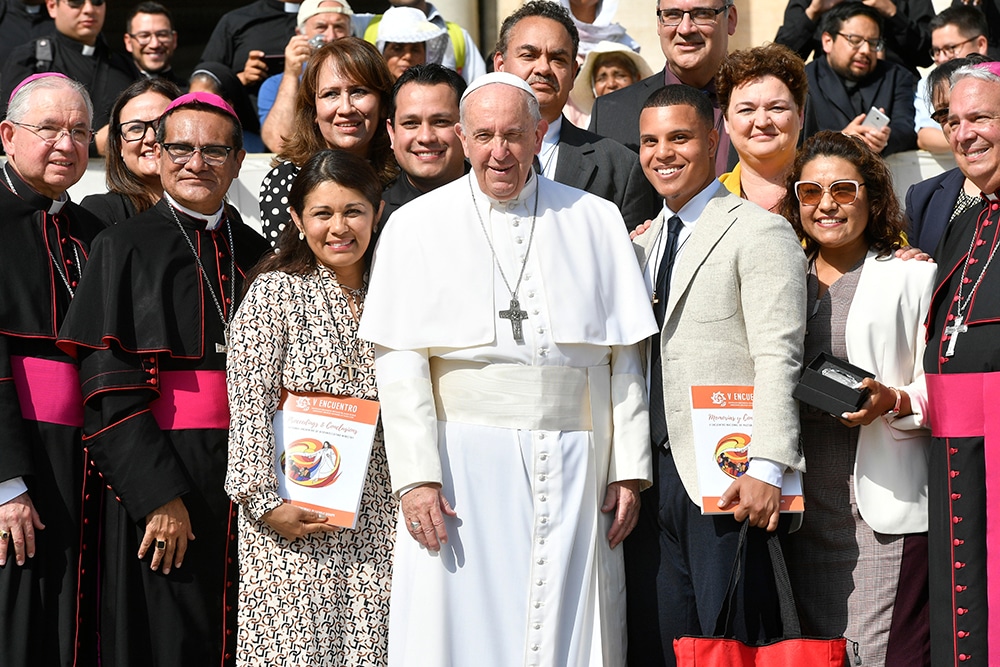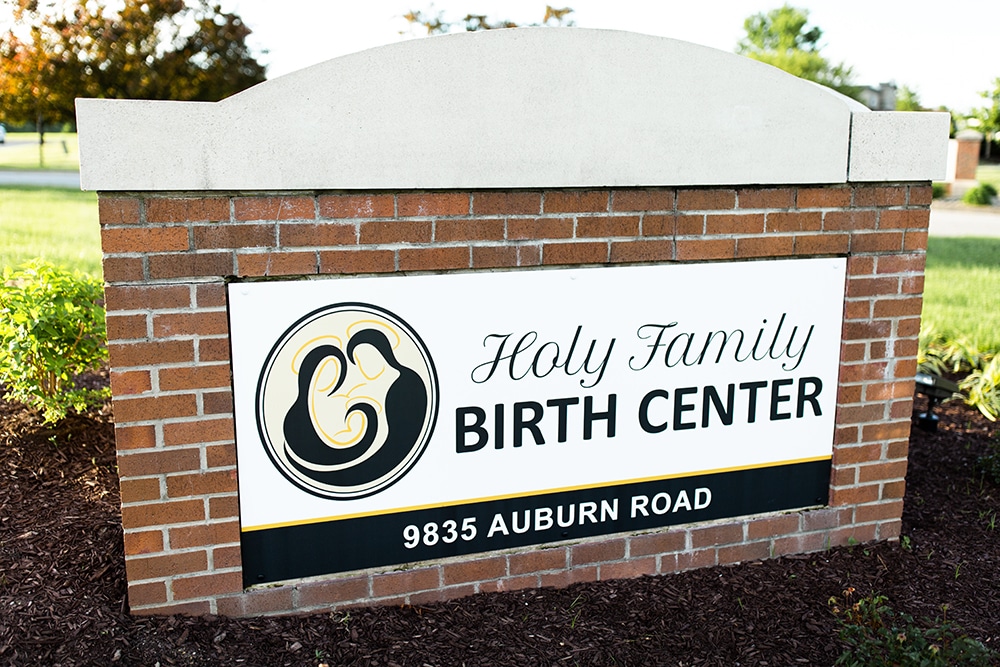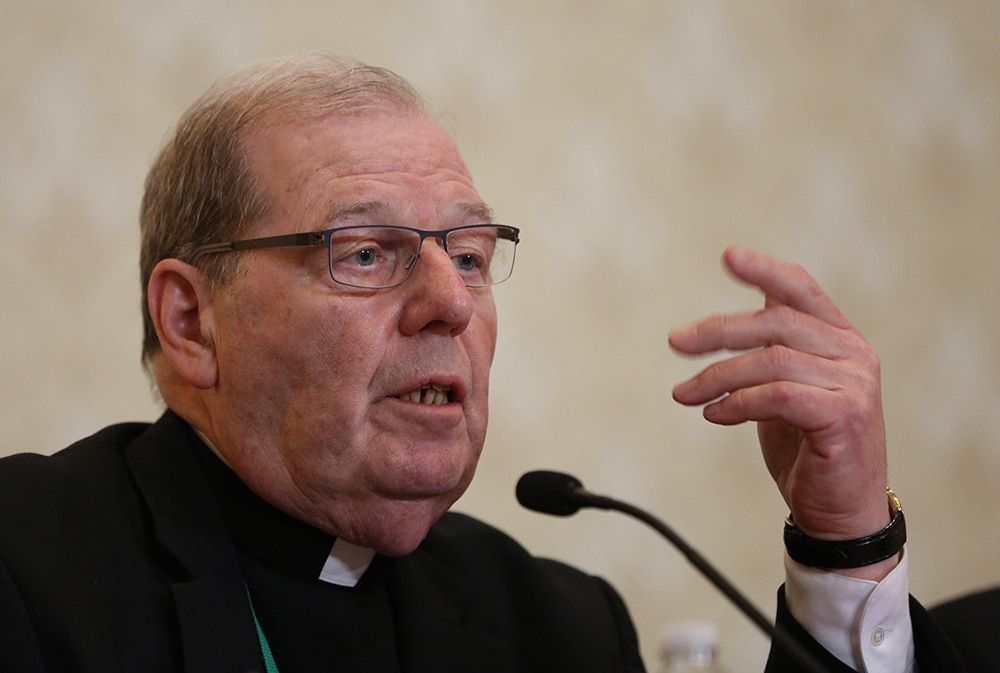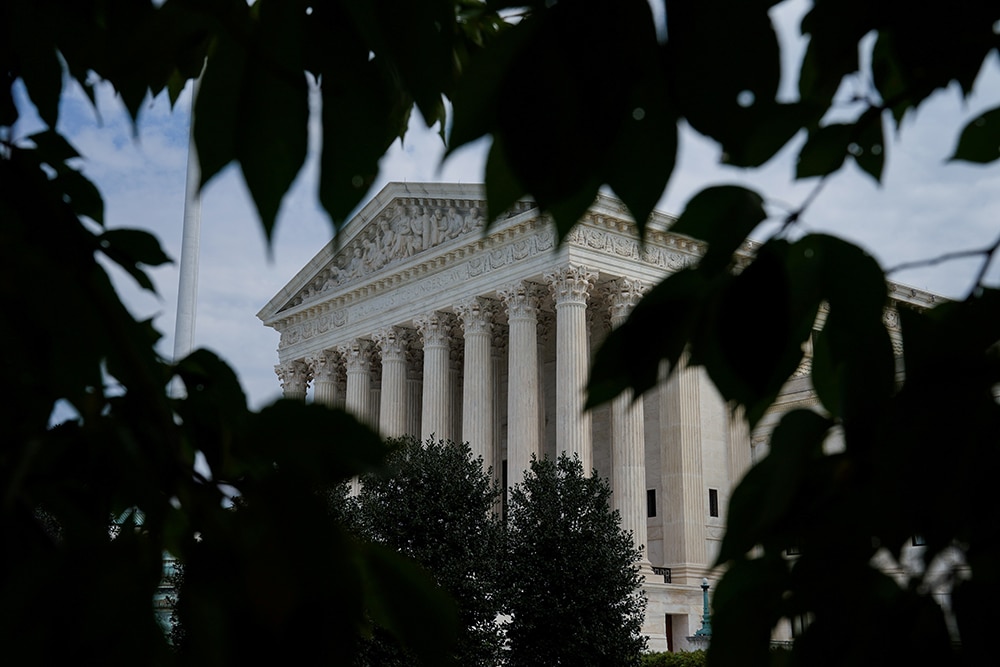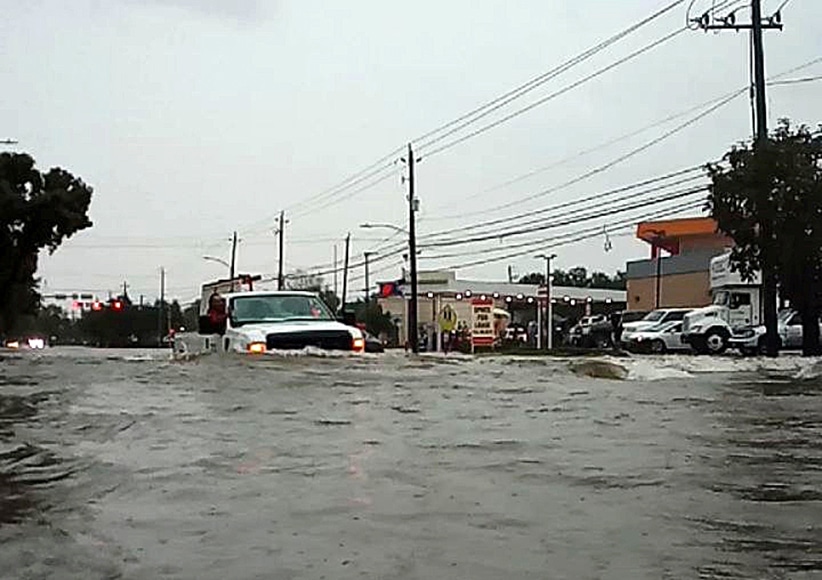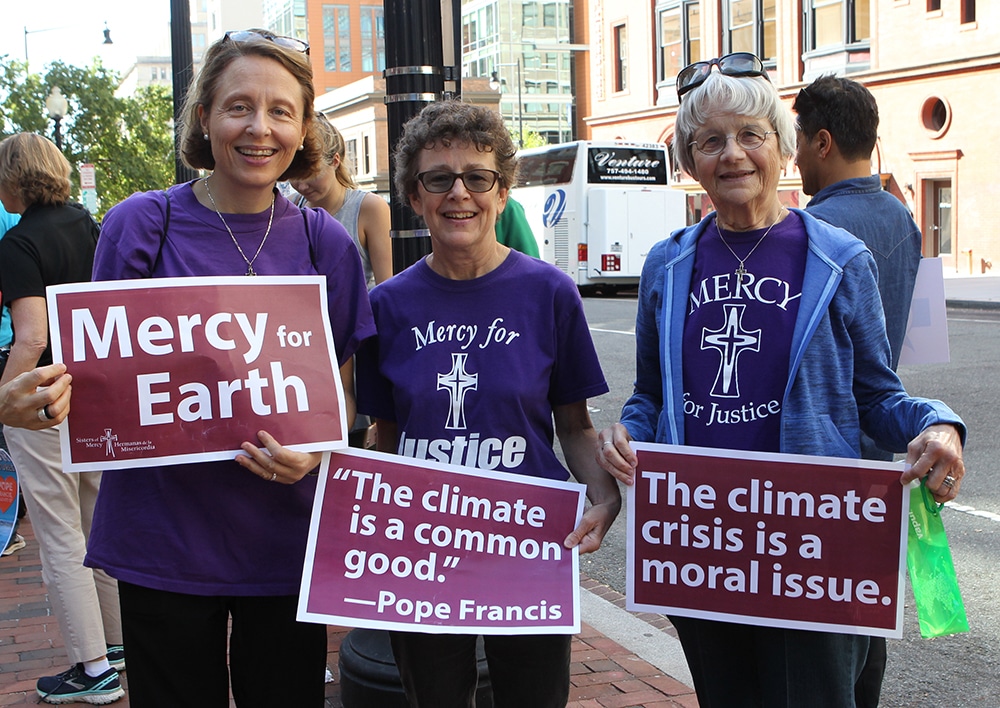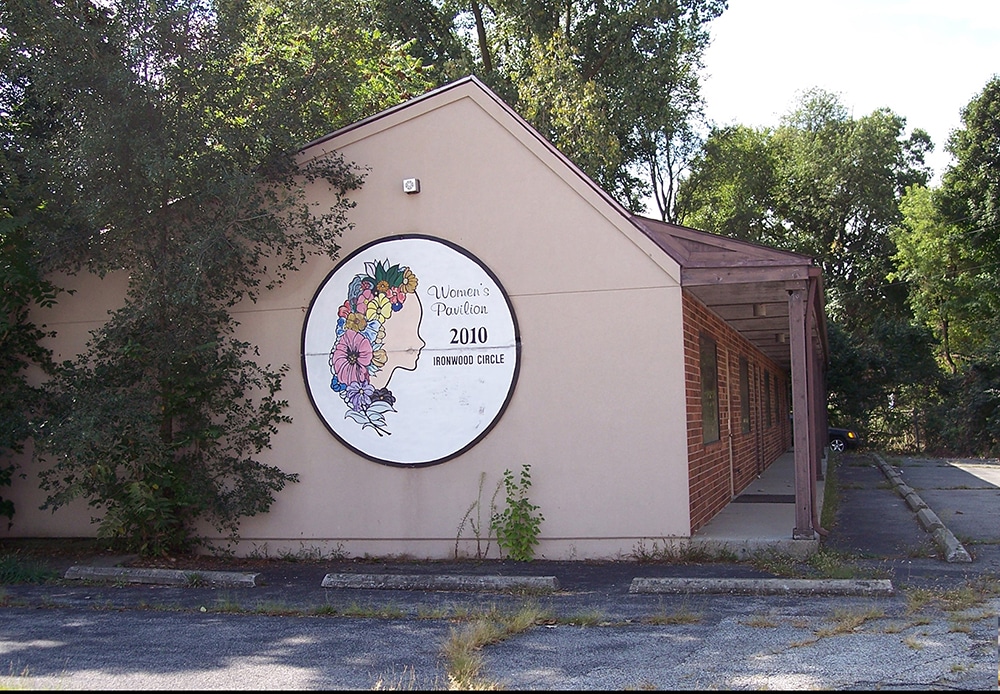A delegation of bishops and Latino Catholic leaders from the United States traveled to Rome in recently to present the proceedings and conclusions of the Fifth National Encuentro of Hispanic and Latino Ministry (V Encuentro) to Pope Francis.
“We bring with us the voices and wisdom of thousands of Hispanic Catholics and other leaders who have accompanied us in this process,” said Bishop Nelson J. Perez of Cleveland, chairman of the U.S. Conference of Catholic Bishops’ Committee on Cultural Diversity in the Church.
| Resources |
|---|
| Additional resources about V Encuentro is available at vencuentro.org. |
The delegates visited Vatican City from Sept. 13-18 and met with the leadership and staff of several Vatican offices, including the Pontifical Council for Culture, the Dicastery for Promoting Integral Human Development and the Pontifical Commission for Latin America. The visit concluded with an audience the pope.
In a prepared statement before he left for Rome, Bishop Perez said the pope and several Vatican officials supported V Encuentro and followed its developments.
“They have accompanied us with their presence, messages and prayers,” Bishop Perez said.
Speak out about Catholicism
Encuentro — “Encounter” in Spanish — is a four-year process of discernment and action, initiated by the national bishops’ conference, to better understand and serve the growing Latino Catholic community in the United States. The process began in 2016 and involved consultations at the parish, diocesan, regional and national levels.
“Close to 250,000 participted in the V Encuentro process,” said Hosffman Ospino, an associate professor of hispanic ministry and religious education at Boston College, who serves on the V Encuentro National Team of Accompaniment, also known as ENAVE.
Ospino told Our Sunday Visitor that the final drafts of the proceedings and conclusions of V Encuentro were reviewed in the days leading up to the delegation’s visit to Rome. The document will be published and made available to the wider public in October.
Ospino added that V Encuentro will not end with next month’s publication of the proceedings and conclusions. He said the Encuentro process will continue well into 2020, and that some of its impacts may not be fully seen or felt for a few more years.
“With the Encuentros of the past, many people didn’t see the results until five or 10 years later,” said Ospino, who did say that he has already had some glimpses of some early fruits.
“I would say perhaps the most exciting thing that the V Encuentro produced was developing a language for the Hispanic community in the United States to speak out about Catholicism, to speak up about the possibilities that it has to contribute to building up the Church in the United States,” Ospino said.
Energy and potential
The theme of V Encuentro is “Missionary Disciples: Witnesses of God’s Love.” The dialogue at the local, regional and national levels has focused in large part on not only recognizing how the Church in the United States needs to improve in its ministry for Latino Catholics, but the fact that that they possess gifts and talents to build up the Church and spread the Gospel.
“After the national gathering of Encuentro, you could see among so many bishops and others that there was finally a realization about the potential of the Latino community,” said Maria del Mar Muñoz-Visoso, the executive director of the U.S. Conference of Catholic Bishops’ Secretariat of Cultural Diversity in the Church.
Muñoz-Visoso, who is also a member of the V Encuentro national team and traveled to Rome with the delegation, told OSV that she sees more Church leaders today no longer see Latino Catholics “as a problem to be solved or as a people who passively receive things.”
“They realized that Latino Catholics really have a great energy and a potential that needs to be supported and invested in so they can be leaders who can accompany the bishops in their pastoral priorities for their local dioceses,” Muñoz-Visoso said.
More than 3,500 delegates from across the country attended the national gathering of V Encuentro last September in Grapevine, Texas. Since then, members of the V Encuentro national team have identified a few trends in the wider Church that they attribute to the Encuentro.
They have described an increased awareness among clergy and diocesan staff of the presence and needs of Hispanic Catholics. More dioceses are also reporting improvements in the general attitudes and concern for Hispanic Catholics, starting with more engagement from the local bishop.
“For me, the V Encuentro provided a framework for the Hispanic Catholic community to say, ‘Here we are, ready to give witness to what we believe and to build the Church in the 21st century,'” Ospino said.
Ministries and services
Meanwhile, Encuentro leaders said diocesan offices are collaborating more often on ministries and services for Latino Catholics. New pastoral initiatives are taking shape, especially pertaining to catechesis and evangelization, and youth and young adult ministry.
The U.S. Conference of Catholic Bishops formed the V Encuentro Youth and Young Adult Leadership Initiative, a program to develop form and develop emerging young adult Hispanic leaders and those who serve Latino youth and young adults.
“A top priority for us is working with families, youth and young adults. We need to really focus on those two areas first, and we’re trying to do something on the regional level to respond to that reality,” said Father Alejandro López-Cardinale, the president of the New England region of the National Catholic Association of Diocesan Directors for Hispanic Ministry.
Father López-Cardinale, who is also an Encuentro coordinator in Boston, told OSV that V Encuentro created an opportunity for Hispanic ministry directors to collaborate across diocesan lines. He described seeing new leaders emerging at the parish and diocesan levels with new ideas and insights into improving ministry for Latino Catholics.
Along with prioritizing ministries and catechesis for Latino families, youth and young adults, Father López-Cardinale added that immigration-related matters emerged as a top issue of concern for Latino Catholics during the Encuentro process. The fact that many Latino Catholics are in mixed-status families — where some relatives have legal immigration status but others do not — means there are serious pastoral challenges for Church leaders to contend with.
“Over the past year, Hispanic ministry has been impacted in a very high way by issues related to immigration and racism,” Father López-Cardinale said. “That impacts in many ways everything we do at the pastoral level, so this is something we need to take seriously.”
Engaging Latino youth
Muñoz-Visoso said she has already seen efforts to promote vocations to the priesthood among Latino Catholics, whom she noted comprise only about 6% of seminarians in the United States even though Latinos already comprise a majority of Catholics in large swaths of the South and West.
“I think there is a new sense of urgency with engaging the Latino community and Latino youth,” said Muñoz-Visoso, who added that it would be a mistake for Church leaders to take it for granted that they will remain Catholic, especially as younger generations of Latinos grow up in the United States.
Brian Fraga is a contributing editor for Our Sunday Visitor.

